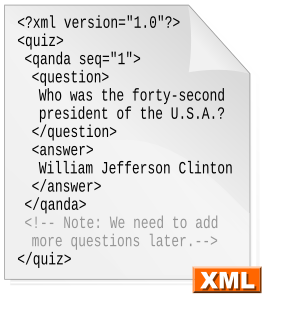XSLT is a language for transforming XML documents into other XML documents, or other formats such as HTML for web pages, plain text or XSL Formatting Objects, which may subsequently be converted to other formats, such as PDF, PostScript and PNG. XSLT 1.0 is widely supported in modern web browsers.
XML Linking Language, or XLink, is an XML markup language and W3C specification that provides methods for creating internal and external links within XML documents, and associating metadata with those links.
MXML is an XML-based user interface markup language first introduced by Macromedia in March 2004. Application developers use MXML in combination with ActionScript to develop rich Internet applications, with products such as Apache Flex.
A user interface markup language is a markup language that renders and describes graphical user interfaces and controls. Many of these markup languages are dialects of XML and are dependent upon a pre-existing scripting language engine, usually a JavaScript engine, for rendering of controls and extra scriptability.
The following tables compare XML compatibility and support for a number of layout engines.

Apache Axis is an open-source, XML based Web service framework. It consists of a Java and a C++ implementation of the SOAP server, and various utilities and APIs for generating and deploying Web service applications. Using Apache Axis, developers can create interoperable, distributed computing applications. Axis development takes place under the auspices of the Apache Software Foundation.
ECMAScript for XML (E4X) is the standard ISO/IEC 22537:2006 programming language extension that adds native XML support to ECMAScript. The goal is to provide an alternative to DOM interfaces that uses a simpler syntax for accessing XML documents. It also offers a new way of making XML visible. Before the release of E4X, XML was always accessed at an object level. E4X instead treats XML as a primitive. This implies faster access, better support, and acceptance as a building block of a program.
The Mozilla application framework is a collection of cross-platform software components that make up the Mozilla applications. It was originally known as XPFE, an abbreviation of cross-platform front end. It was also known as XPToolkit. To avoid confusion, it is now referred to as the Mozilla application framework.
The Multimodal Interaction Activity is an initiative from W3C aiming to provide means to support Multimodal interaction scenarios on the Web.
eXtensible Server Pages (XSP) is an XML-based language, which offers the possibility of dynamically arranged Java code into XML documents.
XAP is a software product presently under development at the Apache Software Foundation. XAP is an XML-based declarative framework for building interactive Ajax web applications. Developers hope to create a product that will interface with various Ajax software toolkits, reduce the need of program scripting and solve the development challenge as well as application maintenance challenges associated with Ajax programming.
An XML framework is a Software framework that implements features to aid the programmer in creating applications with all data produced in XML. The programmer defines and produces pure data in XML format and the framework transforms the document to any format desired. One code, one XML and several transformations like XHTML, SVG, WML, Excel or Word format, or other document type may result.
eXtensible HyperText Markup Language (XHTML) is part of the family of XML markup languages. It mirrors or extends versions of the widely used HyperText Markup Language (HTML), the language in which Web pages are formulated.
eXtensible Text Framework (XTF) is an XML framework created and maintained by the California Digital Library (CDL) based on XML data, XSLT 2.0, and Java. It has primarily been developed and used to present EAD finding aids that describe analog and digital archival collections.
IEEE STANDARD 1855-2016, IEEE Standard for Fuzzy Markup Language (FML), is a technical standard developed by the IEEE Standards Association. FML allows modelling a fuzzy logic system in a human-readable and hardware independent way. FML is based on eXtensible Markup Language (XML). The designers of fuzzy systems with FML have a unified and high-level methodology for describing interoperable fuzzy systems. IEEE STANDARD 1855-2016 uses the W3C XML Schema definition language to define the syntax and semantics of the FML programs.
This page is based on this
Wikipedia article Text is available under the
CC BY-SA 4.0 license; additional terms may apply.
Images, videos and audio are available under their respective licenses.


